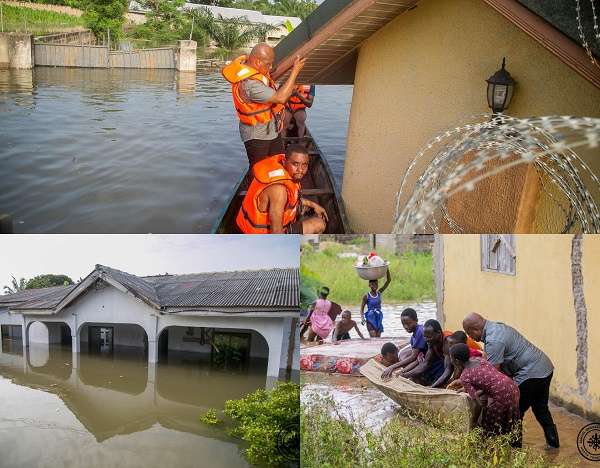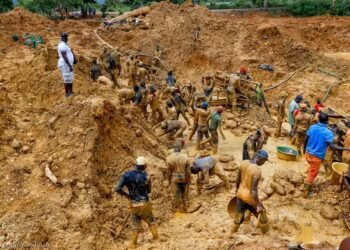Over the the last two weeks, the cameras and headlines have captured the perplexing stories downstream of the Volta Lake, however, relegating a three-year continuous rising level of water and floods upstream.
Reports indicate that contrary to the claims by the Volta River Authority of how sudden the increase in water levels came, districts along the Volta Rivers have been experiencing high levels of water for the past three years. The apparent neglect of the signals upstream metamorphosed into over 4 million residents at risk of very avoidable disaster exacerbated by a national unpreparedness. Over the last three years, the White Volta, the Black Volta, and the Red Volta Rivers have all persistently breached their boundaries, reaching out for homes, livelihoods, and biodiversity.
Eight out of sixteen regions in the country have been impacted by this; partly by the rise in water levels upstream and by the dam spillage downstream. The Savanah Region, Northern Region, Bono East, Oti Region, Western North, Eastern Region, Greater Accra Region, and Volta Region have all been hit.
Bole District, Kpandai District, Sene East District, Sene West District, Pru East District, Krachi West District, Krachi East District, Krachi Nchumuru District, Bia East, Bia District, West Afram Plains District, South Afram Plains District, North Asutsuare-Shai Osudoku District, Ada East District, Ada West District, South Doyi District, North Tongu District and Central Tongu District are the affected districts. According to the 2021 population and housing census, these districts hold over 4 million residents who are at an eminent risk.

These communities residing along the Volta River and Volta Lake in Ghana have intricately woven their livelihoods around the water bodies, drawing essential resources and opportunities in the Volta Basin. The Volta River and the Volta Lake significantly impact the social, economic, and cultural aspects of these communities, playing a central role in their daily activities and overall development.
The Volta River Authority (VRA), established by the Volta River Development Act, Act 46 of the Republic of Ghana, has a core mandate to generate and supply electricity for Ghana’s needs. Moreover, in line with its core mandate, it is also responsible for managing the environmental impact of the creation of the Volta Lake on the towns and people along it.
It, thus, must have taken a keen interest in the water levels of the River Volta upstream. This utter negligence of the rising water levels of the last three years may have been why all these towns downstream are in shambles today.
While it may be quite inappropriate to blame as the danger continues to loom, it may be even more dangerous if VRA continues to act in negligence. Recognizing the situation upstream is necessary in managing the water supply from the White, Red, and Black Volta Rivers into the Lake Volta.
Climate Change plays a major role in all of this. Notwithstanding, the lesson thus far, it is probable that ten years from now like ten years ago, the country might be hoping for the water levels to rise again. It is therefore necessary, for the VRA to consider the situation very holistically.
While focusing on Volta River Authority, the culpability of the Government of Ghana (not the incumbent necessarily) of negligence cannot be overlooked. It ought to have dawned on the nation, that the shortage of water in the dam ten years ago could mean an overrun in another time, especially in erratic climatic times. The signs were very apparent.
Also, the Akosombo Dam, which was built 60 years ago has not undergone any major re-engineering just like the Tema Motorway Nkrumah built, little has been done to meet current needs and challenges. Several governments have overlooked plans for rechannelling excess water from the basin for irrigation and other productive purpose as contained in the country’s 7-year plan.
More so, the government, and for this, the incumbent government, seems not to recognize that over 4 million of its citizens are at direct risk from the threats of the Volta basin. Any further delay in triggering Article 31 is a further negligence.

The necessity of a state of emergency is usually to invite the help of international donors to come to the aid of a country in a disaster. It signals to the international community that a country is being weighed down by an unfortunate circumstance beyond its capacity.
Reference to Article 31(9), “The circumstances under which a state of emergency may be declared under this article include a natural disaster and any situation in which any action is taken or is immediately threatened to be taken by any person or body of persons which— (a) is calculated or likely to deprive the community of the essentials of life; or (b) renders necessary the taking of measures which are required for securing the public safety, the defense of Ghana and the maintenance of public order and supplies and services essential to the life of the community.”
Therefore, any further ado only can be interpreted as utter negligence of the government, as though enough mess has not been done already.
READ ALSO: “Pious” National Cathedral Battles For Credibility



















